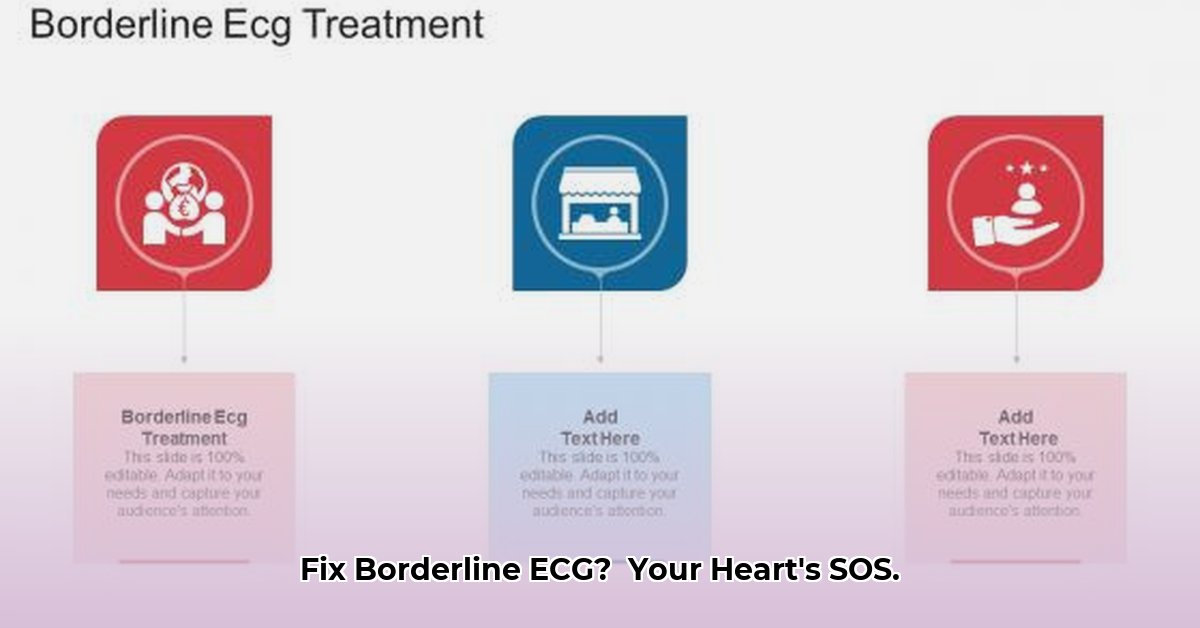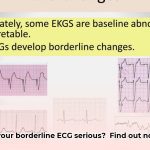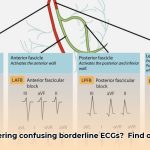Getting a “borderline” ECG result can be unsettling, leaving you wondering about your heart. This article explains what a borderline ECG means, guides you on the next steps, and outlines how to improve your heart health with practical strategies, ultimately empowering you to take control. For more information, see this helpful article on borderline ECGs: Borderline ECG info.
Understanding a Borderline ECG and Heart Health
A borderline ECG suggests minor quirks in your heart’s rhythm or electrical activity, indicating the results aren’t perfectly clear. This isn’t necessarily a major problem but signals a need for further investigation to determine the heart’s health. Consider it a slightly fuzzy picture, prompting a clearer understanding through comprehensive action.
Decoding Your Borderline ECG: It’s Not a Diagnosis, It’s a Signal for Heart Concerns
A borderline ECG points to minor deviations in your heart’s electrical signals from what doctors consider perfectly normal, requiring more information for a complete picture of your heart health. Factors like stress or dehydration can influence the reading. Addressing these signals involves proactive steps to understand the underlying causes and maintaining a focus on preventative care for a healthy heart.
- Minor Deviations: Your heart’s electrical signals show some minor deviations from what doctors consider perfectly normal.
- Further Investigation Needed: A borderline ECG prompts further testing and assessment of heart function.
- Not a Cause for Panic: It is not a cause for immediate panic, it necessitates a thorough assessment.
Your Action Plan: Steps to Take After a Borderline ECG for Improved Well-being
Take charge of your heart health with these definite steps following a borderline ECG, allowing you to be proactive and promote lasting well-being.
-
Chat with Your Doctor – The First and Most Important Step: Your doctor will review your ECG results within your medical history and symptoms, offering personalized advice on the next steps. Be prepared to discuss any medications you’re taking, your lifestyle habits (diet, exercise, smoking, alcohol consumption), and any recent stressors.
-
Exploring Further Investigations – Getting a Clearer Picture: Your doctor may recommend tests like an echocardiogram (ultrasound of the heart to visualize its structure and function), a stress test (monitoring heart function during exercise to identify limitations), or a Holter monitor (24-48 hour ECG) for a detailed assessment of heart function. An event monitor, which you wear for a longer period (up to 30 days) and activate when you experience symptoms, might also be recommended.
-
Addressing Potential Underlying Issues – Getting to the Root of the Problem: Your doctor will pinpoint contributing factors like electrolyte imbalances (variations in blood minerals detectable through a blood test), medication side effects, or stress and anxiety, and suggest solutions and lifestyle modifications to address these concerns. They may also check for thyroid problems or sleep apnea, as these can affect heart health.
-
Lifestyle Changes – Making Lasting Improvements: Emphasize the adoption of a heart-healthy lifestyle, including a balanced diet rich in fruits, vegetables, and lean protein, regular exercise (at least 150 minutes of moderate-intensity or 75 minutes of vigorous-intensity aerobic activity per week), effective stress management techniques (such as meditation, yoga, or spending time in nature), prioritizing 7-9 hours of quality sleep per night, and smoking cessation. Limit processed foods, sugary drinks, and excessive alcohol consumption.
-
Regular Check-ups – Staying on Top of Your Heart Health: Emphasize regular follow-up appointments to monitor progress and adjust your approach as needed with consultations from your healthcare provider. These check-ups may involve repeat ECGs, blood pressure monitoring, and cholesterol checks.
When to Seek Immediate Medical Care – Recognizing Urgent Symptoms
Seek immediate medical help if you experience severe chest pain, sudden shortness of breath, dizziness, a rapid or irregular heartbeat, or fainting, as these could indicate a more serious heart problem needing prompt treatment. Don’t wait: immediate action is crucial. Call emergency services (911 in the US) or have someone drive you to the nearest emergency room.
- Severe chest pain or pressure, especially if it radiates to your arm, jaw, neck, or back
- Sudden shortness of breath, especially if accompanied by chest pain or discomfort
- Dizziness or lightheadedness that won’t go away, or sudden loss of consciousness
- A rapid or irregular heartbeat (palpitations) that feels worrisome or is accompanied by other symptoms
- Fainting or near-fainting
How to Interpret Borderline ECG Results for Older Adults with Chest Pain
For older adults, a borderline ECG result accompanied by chest pain warrants extra attention to protect your heart. As we age, our hearts can become more susceptible to various conditions. That chest pain could be a signal, even if the ECG isn’t definitively pointing to a specific issue. The ECG simply highlights the need for a more thorough evaluation. Consider factors like coronary artery disease, valve problems, and arrhythmias that are more prevalent in older adults.
Understanding Borderline ECGs and Chest Pain in Older Demographics
For older adults, a borderline ECG with chest pain requires extra attention because the aging heart is more susceptible to various conditions that may manifest as early signs on an ECG. Emphasize the need for a holistic approach to understand and address potential cardiovascular concerns. This includes considering age-related changes, pre-existing conditions, and medication interactions.
What to Do Next: Your Action Plan for Chest Pain in Older Adults
Receiving a borderline ECG, especially with chest pain, can be nerve-wracking. Here’s a structured approach:
-
Discuss with Your Doctor: Schedule an appointment to discuss your ECG results and symptoms with your physician as soon as possible. Don’t delay, as timely evaluation is crucial.
-
Further Testing: Your doctor may recommend additional tests to gain a clearer picture of your heart’s health. This might include:
- Echocardiogram: An ultrasound of your heart to assess its structure and function. This can help identify valve problems, heart muscle abnormalities, or signs of heart failure.
- Stress Test: Measures your heart’s response to exercise or medication to reveal any limitations under stress. Different types of stress tests exist, and your doctor will choose the most appropriate one based on your health status.
- Holter Monitor: A portable device worn for 24-48 hours to record your heart’s rhythm continuously. This can help detect intermittent arrhythmias that may not be apparent on a standard ECG.
- Cardiac Catheterization (Angiogram): In some cases, if there’s a high suspicion of coronary artery disease, your doctor may recommend this invasive procedure to visualize the arteries supplying blood to your heart.
-
Lifestyle Modifications: Regardless of the results of further tests, focusing on a heart-healthy lifestyle is vital. This includes:
- Diet: Eating a balanced diet low in saturated and trans fats, sodium, and cholesterol. Focus on fruits, vegetables, whole grains, and lean protein sources. Consider consulting a registered dietitian for personalized dietary guidance.
- Exercise: Regular physical activity, as recommended by your doctor. Start slowly and gradually increase the intensity and duration of your workouts. Even moderate activities like walking, swimming, or gardening can be beneficial.
- Stress Management: Finding healthy ways to cope with stress (yoga, meditation, spending time with loved ones, engaging in hobbies). Chronic stress can negatively impact heart health.
- Quit Smoking: Crucial for improving cardiovascular health. Smoking damages blood vessels and increases the risk of heart disease. Seek support from your doctor or a smoking cessation program.
-
Medication and Follow-up: Your physician may prescribe medication to manage any underlying issues or risk factors, such as high blood pressure, high cholesterol, or diabetes. Regular check-ups are essential to monitor your progress and make adjustments as needed.
Managing Borderline ECG Results in Elderly Patients
A borderline electrocardiogram suggests slight irregularities in the rhythm which requires a closer look, especially managing borderline ECG results in elderly patients where age and other factors might influence the heart’s health. Consider it a yellow traffic light – caution is needed, but it doesn’t necessarily mean a complete stop. What does this mean for you? Further investigation is key.
Understanding Your Borderline ECG in Geriatric Patients
Your ECG is a snapshot of your heart’s electrical activity. A borderline result suggests something might be amiss, requiring a closer look with factors like underlying heart conditions, electrolyte imbalances, medications, stress and anxiety, or technical issues being at play. Understanding these factors is critical to managing heart health effectively. Age-related changes in the heart’s electrical system, such as fibrosis or stiffening, can also contribute to borderline ECG findings.
What Should You Do for Borderline ECG in Geriatric Patients?
Receiving a borderline ECG result doesn’t automatically indicate a serious heart problem. It does, however, necessitate a conversation with your doctor and a plan for further evaluation to safeguard the heart’s electrical activity. Don’t panic! This is the starting point, not the diagnosis.
-
A thorough medical evaluation: Your doctor will review your medical history, conduct a physical exam and discuss your symptoms. Be sure to provide a complete list of all medications you’re taking, including over-the-counter drugs and supplements.
-
Additional Tests: Further investigations like a stress test, echocardiogram (ultrasound of the heart), or a Holter monitor (a portable ECG that monitors your heart rhythm for a
- Wellness Fair Ideas for Work to Boost Employee Wellbeing - December 15, 2025
- Affordable Employee Wellness Fair Ideas for Any Budget - December 14, 2025
- Employee Wellness Programs Strategically Benefit Employee Health And Retention - December 13, 2025
















